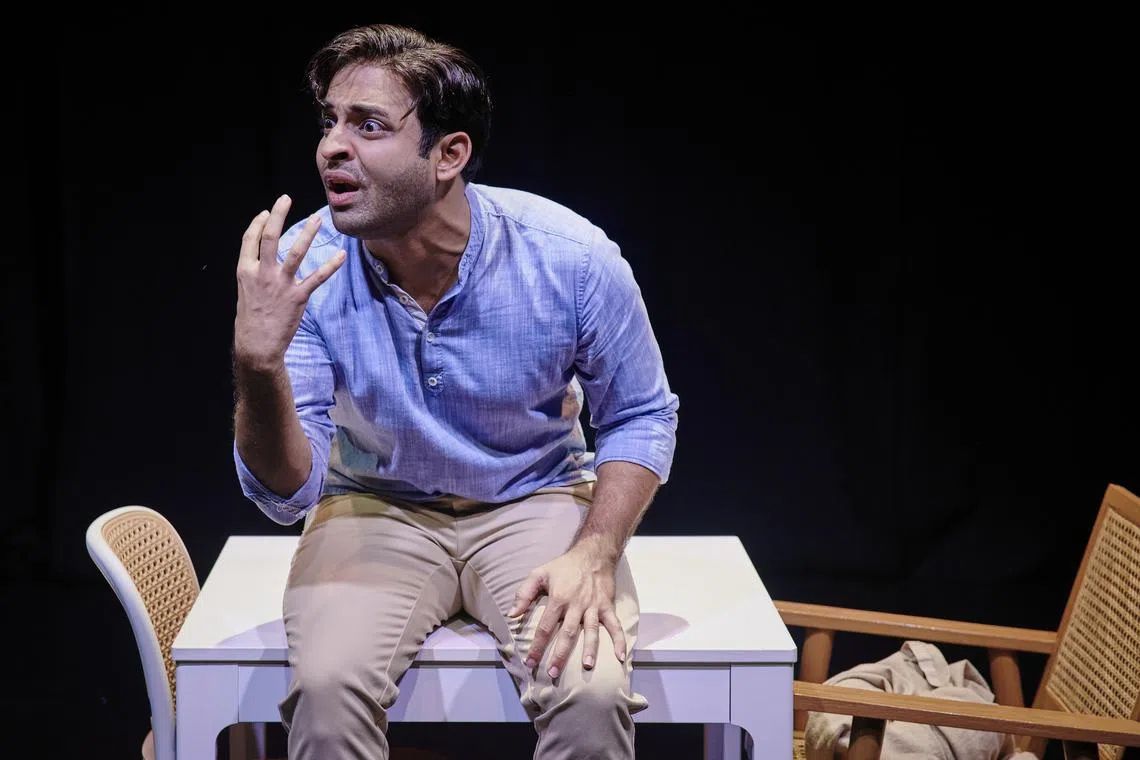Theatre review: Indian Partition need not be defining catastrophe in Haresh Sharma’s Eclipse
Sign up now: Get ST's newsletters delivered to your inbox

Shrey Bhargava toggles among three roles in Eclipse.
PHOTO: TUCKYS PHOTOGRAPHY
Eclipse
The Necessary Stage Practice Space, The Theatre Practice Jan 15, 8pm
A Singaporean man taking his father’s ashes back to his birthplace in Hyderabad is the loose conceit of playwright Haresh Sharma’s extended monologue Eclipse.
The talented Shrey Bhargava is given the opportunity to take on the accents and mannerisms of three generations of Indian men in the family, with the occasional mimicking of their wives.
This pilgrimage back to the son’s ancestral home is also a chance for a corresponding trip down memory lane. Eclipse, however, takes a daring turn in rejecting the fetishisation of heritage that has become par for the course.
Under the direction of A Yagnya, there is a dreamlike quality to the way Bhargava toggles among the son, father and grandfather characters to relate their stories. This process, as is typical of Sharma and Yagnya, is non-linear, proceeding mostly under muted, pointed lighting.
Disparate moments are touchpoints for Bhargava to suddenly switch roles, from man-spreading to stiff-backed, heavy-accented English to a neutral Singaporean sardonicism.
All three lives are connected by the seismic event of the Indian Partition, during which the grandfather was in Japan with a mistress; the father at the centre of the chaos desperately persuading his mother to give the house up; and about which the son is now educating himself, his father having frequently dismissed it as “unnecessary history”.
For the confused, a table and two chairs on the sparse stage make for visual aids, Bhargava gravitating towards each prop in turn for his different roles. But it is a rug that connects all three, in one moment beautifully turned into a pall over a coffin, given shape by the underlying furniture.
This is one of the few truly elegiac moments in a play which can at times feel too talky and explicit in its narration.
The accompanying Hindustani vocalist Sveta Kilpady, though, is successful in conjuring an ethereal atmosphere that just about calms things down. Her rhythmic tabla beats morph from the sound of fireworks to bullets and do more for the ratcheting up of tension than the text.
Still, Sharma’s rejection of the legacy of the Indian Partition takes things into refreshing territory, reflective, perhaps, of the view of the Singapore Indian community. His painstaking sketching out of the lives of the three men is as much about diversity as the ways in which a global tragedy can still be confined to just a section of the lives of those who went through it.
It is interesting to juxtapose this with HuM Theatre’s adaptation of Khushwant Singh’s 1956 novel Train To Pakistan, which sought to find in the story of the Partition a parallel to all tragic conflicts.
In Eclipse, people avoid pain, suppress it and move on. There is hope that even the most profound hurt can be diluted in time.

Vocalist Sveta Kilpady conjures up an elegy as Shrey Bhargava mourns.
PHOTO: TUCKYS PHOTOGRAPHY
Book It/Eclipse
Where: Practice Space, The Theatre Practice, 54 Waterloo Street necessary.org/main-season/eclipse
When: Jan 16 and 17, 8pm; Jan 18, 5 and 8pm
Admission: $38
Info:



